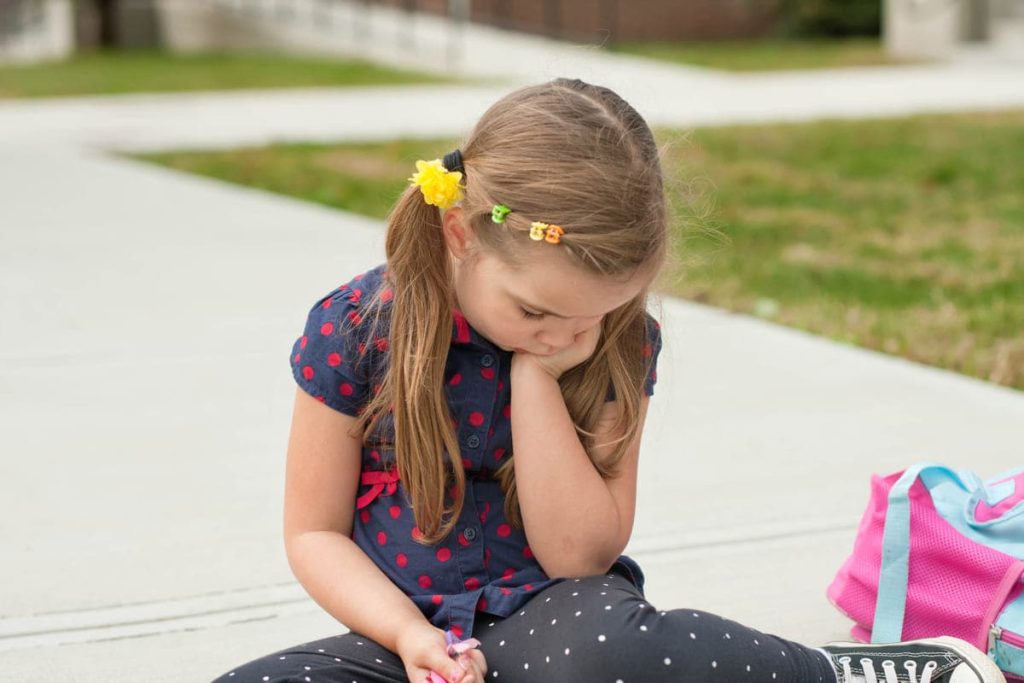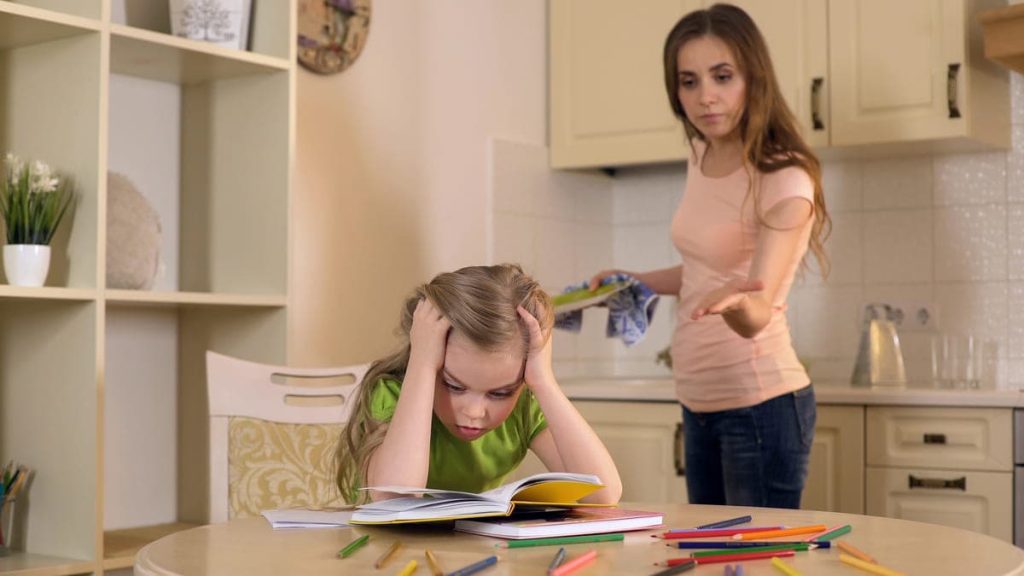Helicopter parenting is a term that makes us picture images where parents hover over their children, swooping in to rescue them at the first sign of trouble. This parenting style is characterized by a high level of overinvolvement in a child’s life, which often continues through adolescence and into young adulthood.
While the desire to protect and guide our child is natural, the intensity of helicopter parenting brings into question whether this behacoir is crossing the line into being counterproductive or even potentially harmful.
Key Takeaways:
- Helicopter parenting is overinvolved and can persist into a child’s adulthood.
- It may negatively impact the emotional and behavioral development of children.
- Acknowledging the debate on this parenting style and its effects is important for healthy child development.
Understanding Helicopter Parenting

Definition and Origin of the Term
Helicopter parenting refers to a style where parents are deeply invested in their children’s lives, to the point where they hover like a helicopter. This term suggests a protective instinct gone into overdrive. It emerged from the recognition that some parents tend to micro-manage every aspect of their child’s life, from schoolwork to social interactions.
Helicopter Parenting vs. Other Parenting Styles
Helicopter parenting distinguishes itself from other parenting styles by its intensity. Unlike authoritative parenting, which balances demands with responsiveness, or permissive parenting, which is lenient and indulgent, helicopter parenting is defined by:
- High levels of control: Schedule and monitor all activities and decisions.
- Low levels of autonomy: Little room for the child to make choices or mistakes.
In contrast, parenting styles like authoritative or permissive offer varying degrees of freedom and guidance. Helicopter parenting often lacks the balance found in other methods, potentially leading to issues with a child’s independence and self-esteem.
Characteristics of Helicopter Parenting

Helicopter parenting is a highly involved style of raising children, often characterized by close monitoring and a reluctance to grant independence. These parents may believe they’re acting in the best interest of their children, yet their strategies can sometimes be counterproductive.
Intense Monitoring and Involvement
Helicopter parents are known for meticulously tracking their children’s activities and behaviors. They are often physically present or constantly checking in, even in situations where children are safe or in capable hands. Their involvement goes beyond attending school functions; it extends into managing friendships, homework, and extracurriculars.
Problems with Letting Go of Control
The inability to relinquish control distinguishes helicopter parents. They may struggle to allow their children to make decisions, no matter how small.
This behavior demonstrates a profound need to oversee every aspect of their children’s lives, from their academic choices to their social interactions, often with the intention of preventing any possible mistakes or failures.
Anticipation of Children’s Needs and Mistakes
Helicopter parents often anticipate their children’s needs and step in to solve problems before the child has a chance to act.
They are quick to intervene at the first sign of a challenge or error, which may impede the child’s ability to develop self-reliance and problem-solving skills.
These parents hover with the best intentions, hoping to shield their children from hardship and disappointment.
Effects of Helicopter Parenting on Children

Helicopter parenting, characterized by a high degree of over-involvement in a child’s life, can shape their developmental outcomes in varied ways. Insights from research and psychology suggest significant impacts on a child’s growth of autonomy, mental health, and problem-solving abilities.
Impact on Child’s Autonomy and Independence
When parents are consistently overbearing, children often struggle to develop a sense of autonomy and independence.
They may rely heavily on their parents to make decisions for them, leading to challenges when faced with the need to act independently. Without the space to make mistakes and learn from them, children can find it hard to assert their own identities and preferences.
Implications for Child’s Mental Health and Well-being
Excessive parental oversight often correlates with increased levels of anxiety and depression in children. The pressure to meet parents’ expectations can lead to low self-esteem, as children may internalize the idea that they can’t handle tasks on their own. Moreover, helicoptered children might lack self-confidence, feeling inadequately equipped to face life’s challenges without their parents’ intervention.
Influence on Child’s Coping and Problem-Solving Skills
The ability to develop strong coping and problem-solving skills is crucial for any child’s adaptability to life’s stresses. Overprotective parenting can impede the development of these skills. With parents frequently swooping in to ‘rescue’, children may not learn how to handle adversity or solve problems independently, which can lead to a decreased ability to cope with stress and novelty.
Keeping this information in the forefront provides a critical lens through which to view the potential consequences of helicopter parenting, revealing the delicate balance between supportive parenting and over-intrusion into a child’s growth process.
Impact on Adolescents and Young Adults

Helicopter parenting can significantly shape how teens and young adults tackle the challenges of their developmental milestones, affecting everything from their professional aspirations to their social skills.
Transitioning to Adulthood Under Helicopter Parenting
Teens experiencing helicopter parenting often find the shift to adulthood daunting. The over-involvement of parents can disrupt their opportunity to develop autonomy.
It’s not uncommon for these young adults to feel unprepared to handle the responsibilities that come with independence, such as making key life decisions or managing personal finances.
Professional and Academic Outcomes for Teens
The academic performance of teens can be impacted by helicopter parenting habits.
While some parents believe their close oversight increases chances of academic success, evidence suggests it may lead to the opposite.
Teens under constant surveillance tend to exhibit a lack of self-efficacy, with some showing lower performance in academic settings, potentially due to increased anxiety levels and a lack of confidence in their capabilities.
Social and Emotional Regulation Among Young Adults
Young adults with helicopter parents often grapple with social pressures differently. These individuals might have heightened sensitivity to judgement or face challenges forming peer relationships due to limited opportunities to develop social skills.
Emotional regulation is also a struggle as they’ve had less practice in managing stress and disappointment without parental intervention.
Parental Perspectives and Motivations
In exploring the motivations behind helicopter parenting, it becomes clear that parents often grapple with a blend of fear, anxiety, and the desire to give their children a competitive edge in a high-stakes environment.
Fear, Anxiety, and Competitive Mindset
Fear and Anxiety: Parents may feel a tangible fear about the safety and well-being of their children.
This fear often stems from hearing about negative incidents in the media or within their social circles.
Anxiety can drive parents to take on an overprotective role, sometimes to the extent that it could limit their child’s ability to develop essential coping skills and resilience.
- Examples include:
- Restricting a child’s play outside due to fear of injury or abduction.
- Intervening in children’s disputes to prevent potential hurt or disappointment.
Competitive Mindset: There is an increasing emphasis on giving children every possible advantage for future success. This has led to a competitive mindset among parents.
- Manifestations:
- Enrolling children in numerous extracurricular activities to boost college applications.
- Direct involvement in homework and school projects to ensure high grades.
Parental Response to Social Expectations and Pressure
Social Expectations and Pressure: Many parents experience significant social pressure to be perceived as successful in parenting. Social media and community standards can magnify these pressures, pushing parents towards a more controlling style to live up to perceived standards.
- Social Dynamics:
- Comparison: Parents might compare their parenting style and their child’s achievements to those of others.
- Community Standards: In some communities, there’s a collective belief that a child’s success is a direct reflection of good parenting.
Pressure to Conform: The need to fit into societal norms can be compelling. Parents may adopt helicopter parenting behaviors to align with what they believe are the expectations of their culture or society.
- Influences include:
- The idea that not being an involved parent might result in judgment or social ostracism.
- Believing that their children will be at a disadvantage if they are not closely guided and monitored.
Debating the Boundaries of Support

When it comes to parenting, the line between supportive involvement and overprotection can be thin and often blurred. Recognizing where support ends and overprotection begins is crucial for a child’s independent development.
Establishing Healthy Boundaries
Parents must discern which behaviors foster independence and which impede it. Establishing healthy boundaries involves:
- Clear expectations: Both parent and child should understand the family’s values and rules.
- Age-appropriate autonomy: Granting freedom that aligns with the child’s maturity.
- Consistency: A reliable framework helps children predict consequences and feel secure.
Differentiating Support from Overprotection
Distinguishing between support and overprotection means understanding the child’s needs and responding accordingly.
- Encouragement vs. interference: Supportive actions empower children, while overprotection can strip them of self-efficacy.
- Monitoring vs. controlling: Observing from a distance allows a safety net without encroaching on the child’s sense of self.
Consequences and Coping Strategies
Helicopter parenting, characterized by over-involvement, can lead to various detrimental effects on a child’s development.
Children may experience decreased self-esteem, challenges with emotional regulation, and struggle to develop resilience. Subsequently, addressing these issues requires proactive change and the adoption of beneficial parenting practices.
Recognizing Harmful Effects and Seeking Change
The harmful effects stemming from helicopter parenting are quite significant. They might find building relationships difficult, as constant parental oversight can impair social skills. Moreover, children may develop a sense of entitlement or become overly reliant on their parents for decision-making, hindering their capacity for self-advocacy.
Parents should diligently observe and acknowledge these patterns to seek change. Reflecting on factors such as the child’s need for independence or their ability to cope with minor setbacks is imperative. When negative consequences are noted, a conscious effort to adjust parental involvement is crucial.
Adoption of Constructive Parenting Strategies
Parents looking to adopt constructive strategies should focus on fostering resilience and autonomy in their children. One can transition from helicopter to supportive parenting by:
- Setting clear boundaries: This allows children to explore and learn from experiences independently.
- Encouraging problem-solving: Rather than solving every issue, allow the child to navigate challenges.
- Promoting decision-making: Foster a sense of empowerment by letting children make age-appropriate decisions.
In compensation for earlier overcontrol, implementing these strategies can help a child develop the necessary skills for long-term success. It balances involvement with respect for the child’s growing independence, paving the way for healthy emotional and behavioral development.
Cultural Shifts in Parenting
Parenting styles have undergone significant changes driven by evolving societal norms and increased pressures on family dynamics. Here’s how these shifts have manifested from past generations to the present day.
The Evolution From Past Generations
In previous generations, parenting often veered towards an authoritative style, with a clear structure and expectations set by parents. Children were given more freedom to play and take risks, learning from their experiences with less direct oversight.
However, cultural shifts have led to cosseting or overprotectiveness, where parents might hover like helicopters to shield their children from any potential harm or failure.
This helicopter parenting contrasts with past practices, emphasizing close involvement in nearly all aspects of children’s lives.
Modern Pressure on Parents and Children
Modern parents face unprecedented pressures, and so do their children. Extracurricular activities have become a norm rather than an option, with parents orchestrating their children’s schedules meticulously.
This lawnmower parenting, akin to its helicopter counterpart, aims to clear a path for children, removing all obstacles that could cause discomfort or challenge. It embodies the intense cultural shifts where success often hinges on measurable achievements, and there’s a collective anxiety about ensuring children don’t fall behind their peers.
These pressures have altered the parent-child relationship substantially, often with intentions of security and future success but leading to extensive debate on the actual benefits and potential drawbacks of such intensive parenting approaches.
Navigating Educational and Extracurricular Involvement
When it comes to children’s education and activities outside school, a delicate balance is key. Parents often walk a tightrope between supporting their child’s academic and extracurricular endeavors and overstepping boundaries.
Homework, Schoolwork, and Academic Expectations
Kids confront a variety of tasks from homework to project deadlines, which shape their academic performance. Parents should consider their involvement in these areas as a support system rather than a management role.
This means guiding them when they struggle with algebra rather than solving the equations for them. It’s important to foster a home environment that values education but also promotes self-reliance.
- Do:
- Ask open-ended questions about schoolwork.
- Provide a quiet space for study.
- Don’t:
- Complete assignments for them.
- Pressure them excessively to achieve high grades.
Parental Engagement in Extracurricular Activities
Extracurricular activities offer a canvas for social and personal development. When parents involve themselves appropriately in their child’s activities, it fosters a bond and encourages growth. Watching games, volunteering for event organization, or facilitating practice sessions at home can be beneficial.
- Engage:
- Attend events to show support.
- Encourage a balanced schedule.
- Avoid:
- Dictating which activities they should choose.
- Over-scheduling which can lead to burnout.
Parental involvement should aim to empower children to explore their interests and manage their responsibilities, shaping them into capable and independent individuals.
Developing Parent-Child Relationships
Developing strong parent-child relationships hinges on effective communication and fostering independence. The balance between guiding them and knowing when to step back is crucial.
Communication and Conflict Resolution
Parents often assume the role of their child’s first problem-solver. Open communication facilitates understanding and can help resolve conflicts.
For example, a child struggling with schoolwork benefits more from a parent who guides them through their problems rather than one who immediately provides the answers. This approach builds problem-solving skills.
Teaching conflict-resolution skills through modeling and discussion is key. When children understand how to negotiate and deal with disagreements constructively, they’re equipped to handle complex social situations independently.
Encouraging Autonomy and Self-Reliance
Allowing children the space to try, fail, and learn is paramount in developing self-reliance. When a parent steps in less frequently and allows a child to make age-appropriate decisions, such as choosing their own extracurricular activities, it enhances their sense of autonomy.
Promoting self-reliance doesn’t mean parents should be completely hands-off. It’s about providing an environment where children feel secure enough to explore their abilities while knowing support is available when needed. This helps form a solid foundation for their future relationships and personal development.
Fostering Psychological and Emotional Growth
Psychological and emotional growth in children hinges on their ability to navigate challenges independently and to build a strong sense of self. Overprotective parenting, often labeled as helicopter parenting, can inadvertently hinder these developmental milestones.
Emphasizing the Importance of Mistakes
Learning from mistakes is crucial for a child’s development. Mistakes offer practical experiences that foster psychological growth and promote problem-solving skills.
When children are free to err and figure out solutions, they cultivate resilience—an essential psychological trait. Parents who step back allow their children the space to falter and learn, reinforcing that errors are a natural part of the learning process.
Building Self-Esteem and a Sense of Purpose
A child’s self-esteem grows from personal accomplishments and overcoming obstacles. Helicopter parenting can limit these opportunities. Allowing a child to pursue interests and face the ensuing challenges independently strengthens their belief in their capabilities, which is integral to building self-esteem.
These experiences also aid children in discovering their sense of purpose, contributing to their overall emotional growth. It’s the accumulation of these small victories and learned competencies that forge a robust sense of self-worth and direction in life.
Overcoming Helicopter Parenting Challenges
It’s essential for helicopter parents to recognize the importance of adjusting their involvement. They can cultivate healthier relationships by promoting their children’s independence and reducing controlling tendencies.
Strategies for Reducing Controlling Behaviors
Helicopter parents can start by setting clear boundaries that allow their children more personal space to make decisions. This process can involve:
- Scheduling: They should designate specific times when they will check in on their child’s activities, rather than constant monitoring.
- Decision-Making: Encourage children to make small decisions from a young age, gradually increasing the complexity as they grow older.
- Self-Reflection: Parents might keep a journal to monitor their own behavior, recording instances when they feel the urge to control and reflecting on the motivation behind these impulses.
Through these steps, parents can slowly learn to trust their children’s capabilities, which can reduce the pressure and anxiety associated with overparenting.
Helping Children Develop Independence
The goal is to support children in becoming self-reliant adults. Parents can implement the following strategies:
- Problem-Solving Skills: Rather than jumping in to fix every problem, allow children the opportunity to try to solve their own challenges.
- Responsibility: Assign age-appropriate household chores or encourage them to manage a portion of their school responsibilities.
- Confidence-Building: Offer praise for their efforts, focusing on the process and their dedication, to build their self-esteem.
By giving children the space to navigate their own successes and failures, they develop crucial life skills that will serve them in adulthood.
Helicopter Parenting and the Physical Domain
Helicopter parenting can influence various aspects of a child’s development, with physical health and activity levels being particularly susceptible to parental control.
Effects on Children’s Physical Health and Activity Levels
Helicopter parenting, characterized by excessive involvement in a child’s life, often encompasses the physical domain where parents may excessively orchestrate and monitor children’s activities and behaviors. Physical health in children should be a natural byproduct of active play and engagement with their environment.
However, children with helicopter parents might have their activity levels closely managed, limiting opportunities for free play—a key element that supports physical development.
Free play allows children to explore, take risks, and engage in physical activities at their own pace, fostering motor skills and endorsing a sense of autonomy.
In contrast, over-supervised children may experience:
- Reduced engagement in adventurous physical play
- Lower levels of physical activity due to over-scheduling or excessive screen time as a result of parental fears regarding safety
- Potential delays in the development of motor skills and self-regulation abilities
Striking a balance is crucial. Encouraging physical activity without being overbearing can help children develop healthy habits, enhance their physical health, and adopt active lifestyles as they grow.
Psychological Impacts and Disorders
Helicopter parenting can lead to a range of psychological concerns for children, from heightened stress to internalized pressures.
Correlation with Anxiety, Depression, and Perfectionism
Research indicates a significant link between helicopter parenting and mental health challenges in children. Anxiety and depression are more frequently observed in those with overcontrolling parents. They often feel a persistent sense of failure that feeds into perfectionism, where they strive to meet unattainable standards.
- Anxiety: Kids may constantly worry about meeting parental expectations.
- Depression: Feelings of joy and motivation can be diminished under intense parental scrutiny.
- Perfectionism: A perpetual chase for flawlessness is encouraged by excessive parental oversight.
Dealing with Psychological Distress and Low Self-Esteem
Children under helicopter parenting can experience significant psychological distress. They may lack confidence in their own abilities, leading to low self-esteem. This can manifest in difficulties with decision-making and a reluctance to embrace new experiences.
- Psychological Distress: They’re prone to feelings of inadequacy, resulting from the constant evaluation.
- Low Self-Esteem: Excessive parental intervention undermines their sense of self-worth.
Children’s social skills and resilience could be affected, potentially influencing their long-term well-being and adaptation skills.
Future Directions in Research and Parenting Advice
In addressing the implications of helicopter parenting, there are two primary paths to consider: scouting the horizons for new research opportunities and setting guidelines for parenting behavior.
Current Trends and Future Study Avenues
Research into helicopter parenting is gaining momentum, particularly in understanding its effects during the critical phase of emerging adulthood.
Studies show a correlation between overprotective parenting and negative outcomes in a child’s mental health, such as anxiety and depression.
However, the field lacks a systematic understanding of these relationships.
Future research should focus on:
- Longitudinal studies to track the effects over time.
- Cultural influences, as parenting styles and their consequences can vary globally.
- Diverse family structures to discern how helicopter parenting manifests in different contexts, such as single-child households.
- The intersection between helicopter parenting and career adaptability — critical as children develop their professional identities.
Recommending Best Practices for Parents and Educators
Amid the evolving landscape of parenting strategies, recommending clear best practices is essential. They should broadly address fostering independence while providing appropriate support.
For Parents:
- Balance: Find a middle ground between guidance and freedom.
- Awareness: Recognize your child’s developmental needs and adapt accordingly.
For Educators:
- Communication: Establish open channels with parents to discuss child development and autonomy.
- Resource Provision: Offer workshops or materials on effective parenting strategies that encourage healthy autonomy.
By intertwining updated research and practical parenting advice, society can cultivate better environments for children to grow into resilient adults.
Frequently Asked Questions
Helicopter parenting is a hot topic, and many are curious about how this intense parenting style can affect children long-term. These FAQs dive into the specifics.
How does helicopter parenting impact a child’s development as they become adults?
Helicopter parenting can lead to difficulties for children in making decisions and solving problems independently as they grow into adulthood, as they may have had less opportunity to practice these skills during their upbringing.
What are some common negative outcomes associated with helicopter parenting?
Children raised by helicopter parents may experience increased anxiety, diminished self-confidence, and a lack of autonomy, which can hinder their ability to handle challenges in life effectively.
What are strategies for coping with overbearing parents?
Strategies include setting healthy boundaries, communicating openly about needs and feelings, and seeking support from other family members, friends, or professionals to establish a sense of individuality.
Can overly attentive parenting lead to psychological trauma?
While not always the case, overly attentive parenting can sometimes contribute to psychological stress in children, which may manifest as anxiety or depression due to the intense pressure to meet parents’ expectations.
Why might helicopter parenting be considered a harmful approach?
This parenting style is often deemed harmful because it can stifle children’s emotional growth, inhibit their problem-solving abilities, and hinder their resilience by not allowing them to experience and learn from failure.
Is there a link between helicopter parenting and narcissism in parents?
Some suggest a possible link between helicopter parenting and narcissistic tendencies in parents, as this style of parenting might stem from a parent’s need for validation through their child’s achievements and dependence.






